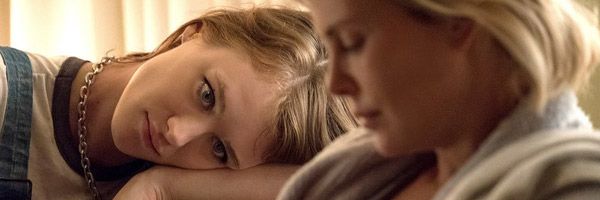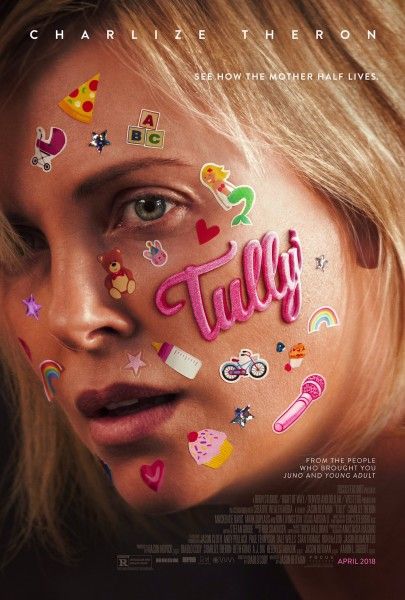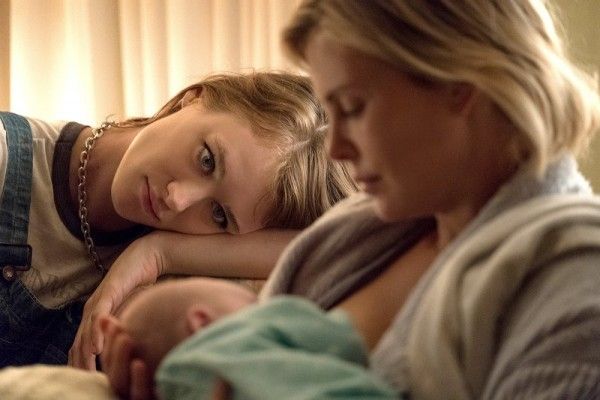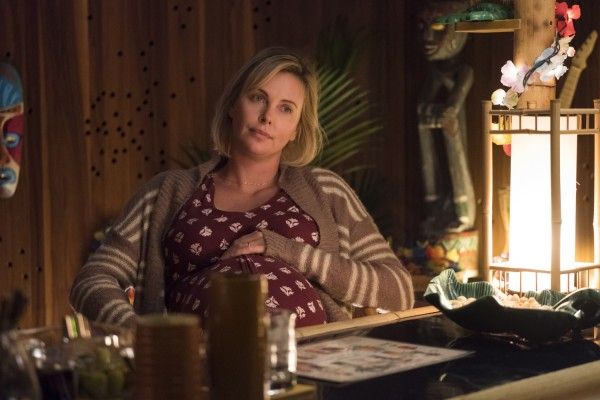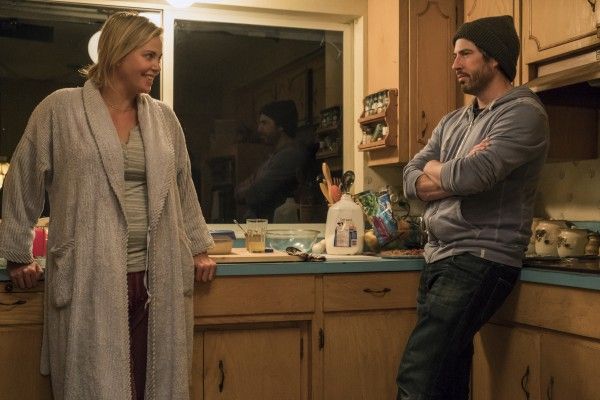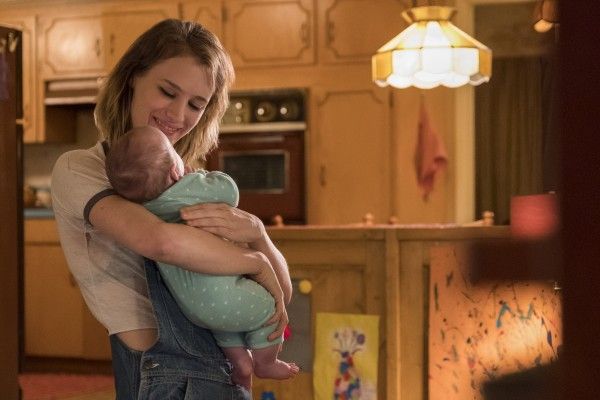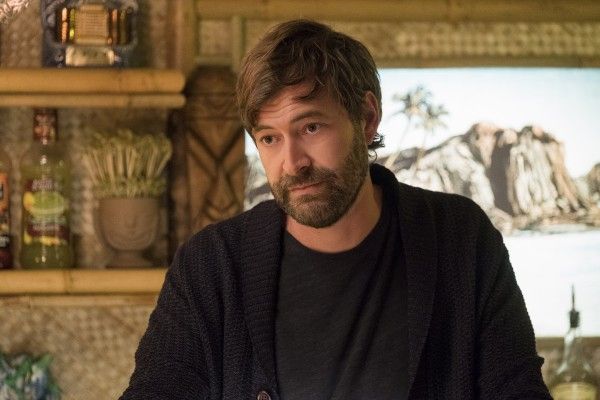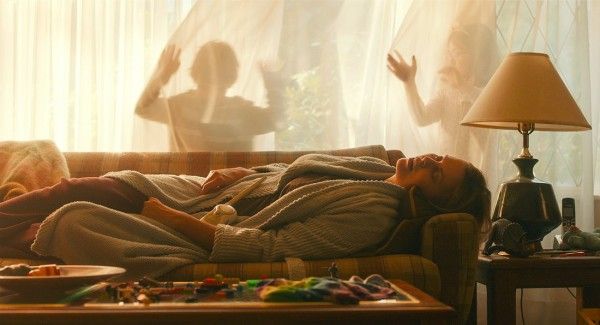One of my favorite films from this year’s Sundance Film Festival was director Jason Reitman’s Tully. Written by Diablo Cody, the film stars Charlize Theron as Marlo, a mother of three, including a newborn, who is gifted a night nanny by her brother, played by Mark Duplass. Hesitant to the extravagance at first, Marlo comes to form a special bond with the thoughtful, surprising, and sometimes challenging young nanny named Tully (Mackenzie Davis).
While the previous pairings of Reitman and Cody have led to some great films (Juno, Young Adult), Tully is my favorite of the bunch. It captures – with brutal honesty – the challenges of being a mother while also trying to maintain a marriage and yourself. In addition, Charlize Theron is absolutely fearless in the role and delivers a stellar performance. For more on Tully you can read Matt Goldberg’s review.
With the film now playing in limited release I recently landed an exclusive interview with Diablo Cody. She talked about where the idea came from, the way she writes, her fantastic dialogue, the way she collaborates with Jason Reitman, and more. In addition, towards the end of the interview we get into some major spoilers which you should only read if you’ve seen the film. That section is clearly marked so you’ll know where to stop if you haven’t seen the film.
Check out what she had to say below.
I'll start by saying congrats on the movie. Thought it was great.
CODY: Oh, thank you.
Yeah. It's really a brutally honest look at motherhood and family. Where did this idea come from?
CODY: Honestly, I felt like ... you know, I have three kids and I felt like at a certain point I was going to have to write about the parenthood experience, because I hadn't up to that point really. And I had gone through the incredibly sort of intense and transformative of giving birth three times. And it had gotten to the point where I thought, alright, what do I have to say about this? And, you know, I wrote the movie when my youngest was an infant.
And I used this process, the process of writing the script, as a form of therapy. It really kind of helped me through an intense and anxious time in my life. Because for whatever reason, parenthood gets easier for some people, but for me, making that jump from two kids to three was just brutal. And I just ... you know, I guess my two choices were psychiatric care or to try and channel some of those painful emotions into a script. And so I did the latter.
Yeah. Probably a better idea. As a writer, do you keep a pad of paper with you and when you experience something in life, you're writing it down. Or are you able to sort of pull those events from your life or things that you've heard when you're actually sitting down to write a script?
CODY: You know, I'm not a person who jots things down during the day. I have certain themes that I come back to all the time in everything that I write. And I am a magpie in terms of overhearing conversations and absorbing things around me and using them as inspiration. I've always done that. But, yeah. It's strange. I don't ever consciously think to myself, like oh, okay, like this is the story I'm going to tell or this is the story that would be marketable right now. I almost wish I had that ability to be honest, because I think I probably would have had a more commercial career if I could do that.
But I just ... occasionally, I feel compelled to tell a specific story. I don't know where it comes from? And I just do it. And if it works, it works. And if it doesn't, it doesn't. I've had to let go of any fear of failure at this point.
You're known for having such great dialogue and Tully is no different. I mean, there's some great, sharp one-liners—
CODY: I think that's really nice. Thank you.
Talk a little bit about where those lines ... like, do you know when you've written a line that it's really good?
CODY: No. I don't know if anything is going to work or not. I'm actually really bad at gauging those things. I'm often surprised by ... for instance, when I saw the trailer for Tully, I was surprised. I loved the trailer because it's always fun to see the trailer for a movie, but I was like, oh, they think that line is good? You know? I never really ... it's not something I think about too much. I guess I just ... I sort of imagine, on the simplest level, I imagine the conversation between Marlo and Tully and this is what Marlo says and this is what Tully says and I'm almost like this interpreter.
I don't ever feel ... you know what always made me chuckle in the script? For some reason I love when Marlo talks about how she feels like that garbage barge that was floating around New York City and eventually wound up in Brooklyn. And like that's ... I don't actually know if ... I don't know if other people think that's entertaining or not, but it's entertaining to me.
And that's all that matters.
CODY: Exactly. Yeah. I should just make myself chuckle.
Yeah. Exactly. So, you worked with Jason [Reitman] a few times now.
CODY: Yes.
In all three films, has a lot changed on set or is it pretty much the script gets locked before you walk on set and it's minimal changes?
CODY: Minimal changes always. And that's what's kind of incredible about Jason. He just puts such a tremendous amount of trust in me. And he trusts me to tell any story that I want to tell and he if he wants to change anything, he talks to me. He'll incorporate songs that I've put in the script into the movie, which is crazy. I don't know any other director that would do that. But, he'll know when a song is important to me and he'll sort of respect the role that it plays in the scene. And he also chooses a lot, too, obviously. But yeah. He's just ... on set, he's such a calm yet authoritative presence. He really is amazing to watch. It's something I could never do. It's just a completely different skill set than what I have, so working with him is just perfect. I would love to do it over and over again.
Out of the three scripts you've made together, what's a big change that has happened on set that you weren't expecting?
CODY: On the set?
Or a big change from the script to the finished film?
CODY: Oh, from the script to the screen? I thought you meant like the vibe. And I was like, I guess we're all just old. From script to screen? Oh, you know what I wasn't expecting? You know, Jason cut together a glorious montage in Tully that just shows you the day-to-day rigor of taking care of an infant. And that was something that took the entire shoot. He shot pieces of it every single day. And it's honestly, it completely captures the tension and the anxiety of being responsible for a fragile baby. And that wasn't something that I put in the script and it was such a lovely surprise.
-
SPOILER WARNING: DO NOT READ ANY FURTHER UNLESS YOU HAVE SEEN TULLY
-
Before I run out of time with you I want to actually touch on some spoilers, but I want to run it after the film's been released and people have had a chance to see it. Would you mind actually talking about some stuff?
CODY: No. I would love to.
So was the twist always part of the story?
CODY: Yes. The twist is the story. The twist was the origin of the story. The twist is why I told the story.
Did you ever think about putting in clues beyond Tully not interacting with any of the other characters?
CODY: There are actually clues throughout.
Really?
CODY: Yeah.
I might have to see it again.
CODY: You'll notice that one of the very first conversations that they have, Tully quotes sort of a semi-obscure work of English literature. And later we find out that that was Marlo's major. Basically, the whole sort of body of knowledge that Tully has is Marlo’s.
Sure.
CODY: Because we are meeting a younger, more curious, sort of fresh, out-of-college version of Marlo. And, I mean, there's the a lot. I don't want to give it all away. But you watch the movie again, you'll see.
I've only seen it once. And I will say, though, that as someone who watches an awful lot of movies, the film does a phenomenal job of keeping that card very close to the vest.
CODY: And that's ... I'll give that to Jason, because to be honest, I didn't think that was possible at all. I was like, people are going to see this coming a mile away. And you know, had I directed it, they would have. That was his balancing act that he pulled off and I'm happy to hear people saying ... because a lot of people have told me that they didn't see it coming. And that's thrilling to me.
Do you remember where this idea came from in terms of with the twist and everything?
CODY: Oh, absolutely. I mean, I was in a place where I was completely exhausted. And I was thinking to myself, like God, I wish somebody could just step in and take care of me and take care of every aspect of my life, from cleaning to sex to letting me sleep, like all of it. And I thought, you know who would have been great at this? My 23 year old self, because I had boundless energy and enthusiasm. And it kind of makes you realize why human beings are psychologically wired to have babies earlier than I did. Because you know, I'm not a geriatric mom, but I'm on the older side. And you know, I can't help but wonder what ... I would have been a shitty mom at 23, but I would have had a lot of energy.
What other scripts are you working on or trying to develop?
CODY: As of right now, the massive event taking place in my life is, I'm opening up a musical with Alanis Morissette in Boston.
Wow.
CODY: Yeah. So, this is a ... I'm leaving in the morning and it's going to be a summer of theater.
That sounds amazing and awesome.
CODY: Yeah. I'm excited.
Absolutely. I want to say again, congrats on the movie, thank you so much for giving me your time and have a great day.
CODY: Thank you. You have a great day, too.
Tully is now playing in theaters.

